Top 10 UArizona Health Sciences News Stories of 2021: COVID-19, Cannabis for Pain Relief, Valley Fever and More
COVID-19 dominated coverage but research by faculty, staff and students continued to advance health care and make headlines around the world.
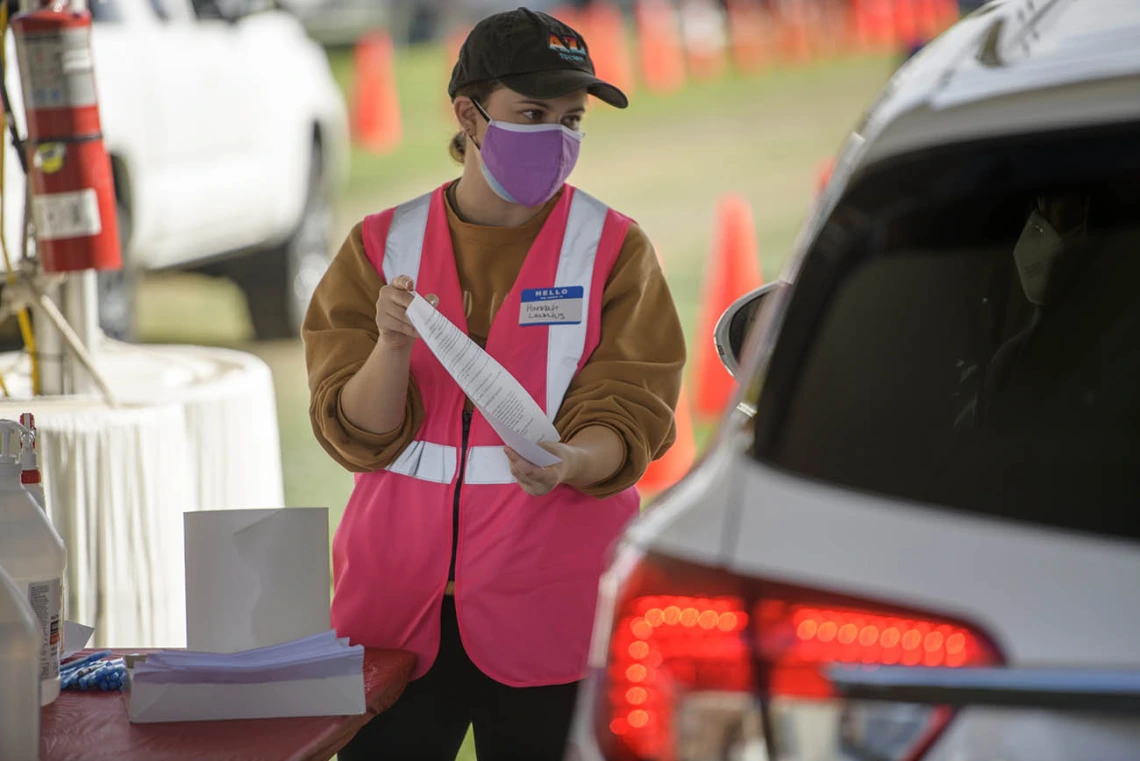
Mel and Enid Zuckerman College of Public Health graduate student Hannah Launius volunteers at the check-in area of the COVID-19 vaccination distribution site on the University of Arizona campus.
As the national and international news shifted focus from COVID-19 antibodies to vaccines and coronavirus variants, University of Arizona Health Sciences researchers continued to meet the pandemic’s challenge by finding answers to the biggest questions about vaccine effectiveness, mental health concerns and infection risks.
In other areas, leading faculty, physicians, scientists, staff and students searched for a viable non-opioid treatment for pain, worked to unravel the mysteries of neurodegenerative diseases including Alzheimer’s and tested the first potential canine Valley fever vaccine.
Here are the Top 10 UArizona Health Sciences news releases of the year:
No. 1
COVID-19 Vaccines Reduce Viral Load, Severity in Breakthrough Cases, Studies Find
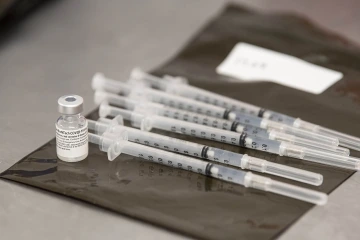
Mel and Enid Zuckerman College of Public Health graduate student Hannah Launius volunteers at the check-in area of the COVID-19 vaccination distribution site on the University of Arizona campus.
Individuals who contract COVID-19 after vaccination are likely to have a lower viral load, experience a shorter infection time and have milder symptoms than unvaccinated people, according to research using data from University of Arizona Health Sciences studies. “If you get vaccinated, about 90% of the time you’re not going to get COVID-19,” said Jeff Burgess, MD, MS, MPH, professor at the UArizona Mel and Enid Zuckerman College of Public Health, member of the BIO5 Institute and principal investigator of the Arizona Healthcare, Emergency Response, and Other Essential Workers Surveillance (AZ HEROES) study. “Even if you do get it, there will be less of the virus in you and your illness is likely to be much milder.” (June 30)
No. 2
The Entourage Effect: Cannabis Terpenes and Pain Relief
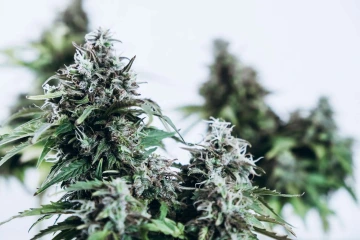
Researchers in the Comprehensive Pain and Addiction Center have found that terpenes mimic cannabinoids and produce similar pain-relieving effects.
Researchers in the University of Arizona Health Sciences Comprehensive Pain and Addiction Center found evidence that favors the entourage effect theory and positions Cannabis sativa terpenes as a promising new target for pain therapies. “A lot of people are taking Cannabis and cannabinoids for pain,” said John Streicher, PhD, associate professor of pharmacology at the UArizona College of Medicine – Tucson. “We're interested in the concept of the entourage effect, with the idea being that maybe we can boost the modest pain-relieving efficacy of THC and not boost the psychoactive side effects, so you could have a better therapeutic.” (July 14)
No. 3
Study Shows Vaccine Protects Dogs Against Valley Fever
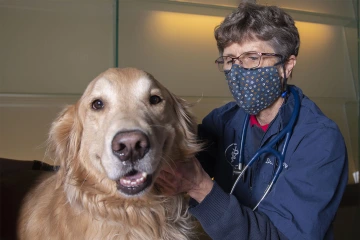
A team led by Valley Fever Center for Excellence researchers successfully tested a vaccine for dogs, with two doses providing high levels of protection.
A possible canine vaccine to protect against Valley fever took one giant step toward becoming a reality thanks to a College of Medicine – Tucson-led study that showed the vaccine provided a high level of protection against Coccidioides posadasii, a fungus that causes Valley fever. The development of a potential canine vaccine serves as a positive harbinger of a human vaccine. “The idea of a vaccine to prevent Valley fever has been the holy grail since the 1950s,” said John Galgiani, MD, director of the Valley Fever Center for Excellence and a BIO5 Institute member. “We created a vaccine that worked. The dogs had all sorts of laboratory evidence of active, very widespread disease, and the vaccine prevented it.” (Oct. 26)
No. 4
Advancing Hormone Therapies to Reduce Alzheimer’s Risk

When it comes to post-menopausal hormone therapy, the type, route and duration all play a role in reducing the risk of neurodegenerative diseases.
Women on hormone therapy were less likely to develop neurodegenerative diseases including Alzheimer’s disease, according to a University of Arizona Health Sciences study. The findings could lead to the development of a precision medicine approach to preventing neurodegenerative diseases. “This is not the first study on the impact of hormone therapies on neurodegenerative disease reduction,” said Roberta Diaz Brinton, PhD, director of the UArizona Center for Innovation in Brain Science, professor of pharmacology and member of the BIO5 Institute. “But what is important about this study is that it advances the use of precision hormone therapies in the prevention of neurodegenerative disease, including Alzheimer’s.” (July 9)
No. 5
Compound Developed at UArizona Health Sciences Provides Innovative Pain Relief
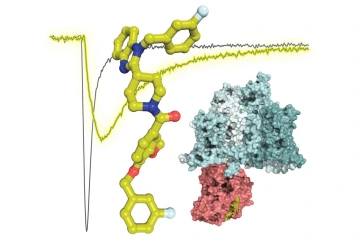
Researchers targeted a common sodium ion channel to reverse pain and saw positive results that could lead to a non-addictive solution to treat pain.
University of Arizona Health Sciences researchers are closer to developing a safe and effective non-opioid pain reliever after a study showed that a new compound they created reduces the sensation of pain by regulating a biological channel linked to pain. “Drug discovery for chronic pain is at the forefront of this research, and it’s being amplified by the intersection of the COVID-19 pandemic and the opioid epidemic,” said Rajesh Khanna, PhD, associate director of the UArizona Health Sciences Comprehensive Pain and Addiction Center, professor of pharmacology and BIO5 Institute member. (Nov. 10)
No. 6
Harmful Alcohol Use Rising During Pandemic, UArizona Health Sciences Researchers Say

A study led by researchers in the Department of Psychiatry found hazardous alcohol use increased monthly for those under stay-at-home orders.
A study led by researchers in the College of Medicine – Tucson’s Department of Psychiatry found that hazardous alcohol use increased monthly for those under stay-at-home orders. “Being under lockdown during a worldwide pandemic has been hard on everyone, and many people are relying on greater quantities of alcohol to ease their distress,” said William "Scott" Killgore, PhD, a professor of psychiatry, director of the Social, Cognitive and Affective Neuroscience Lab and BIO5 Institute member. “We found that younger people were the most susceptible to increased alcohol use during the pandemic, which could set them on the dangerous path toward long-term alcohol dependence. (Feb. 15)
No. 7
Cancer Patients May Not Be Fully Protected by COVID-19 Vaccine

Researchers find lower immune response to COVID-19 vaccine for patients on chemotherapy; third dose of Pfizer-BioNTech vaccine boosts immune response.
The COVID-19 pandemic has been an especially stressful time for cancer patients undergoing chemotherapy, which attacks not only the cancer, but also the immune cells needed to defend the body from infections. University of Arizona Health Sciences researchers found that patients undergoing active chemotherapy had a lower immune response to two doses of the COVID-19 vaccine, but a third dose increased response. “We wanted to make sure we understand the level of protection the COVID-19 vaccines are offering our cancer patients, especially as restrictions were being eased and more contagious variants were starting to spread,” said Rachna Shroff, MD, MS, chief of Gastrointestinal Medical Oncology at the UArizona Cancer Center, director of the Cancer Center Clinical Trials Office, and a member of the BIO5 Institute. (Sept. 30)
No. 8
Cholesterol May Be Key to New Therapies for Alzheimer’s Disease, Diabetes

A unique approach to tackling these two diseases has allowed Dr. Gregory Thatcher to look beyond traditional causes to find novel therapies.
A University of Arizona Health Sciences researcher examined the role of cholesterol in Alzheimer’s disease and Type 2 diabetes to identify a molecule that may help regulate cholesterol levels in the brain, making it a potential new therapeutic target for Alzheimer’s disease. “Alzheimer’s and diabetes share many common causes,” said Gregory Thatcher, PhD, R. Ken and Donna Coit Endowed Chair in Drug Discovery in the UArizona R. Ken Coit College of Pharmacy. “Our goal was to develop a way of identifying compounds that would counteract many detrimental changes that contribute to both Alzheimer’s and Type 2 diabetes.” (March 23)
No. 9
U.S.-Mexico Asthma Study Examines Hygiene Hypothesis Amid Pandemic
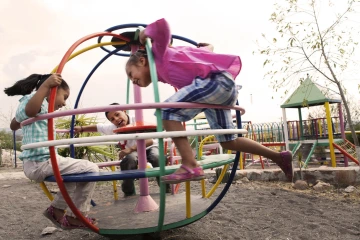
The hygiene hypothesis, the idea that children exposed to more germs early on in life develop greater immunity and are less likely to get asthma and other diseases, will be explored in a UArizona-led cross-border study.
An investigation of children’s susceptibility to asthma and other illnesses in the United States and Mexico was the focus of a University of Arizona Health Sciences Asthma and Airway Disease Research Center study. “There is four times less asthma there than here, and our studies show the main reason is that although children in Nogales, Sonora, are exposed to harmful bacteria that cause many infections, they are also exposed to a lot of protective bacteria that train their immune system to distinguish between dangerous and innocuous microbes,” said Fernando Martinez, MD, director of the Asthma and Airway Disease Research Center, the Swift-McNear Professor of Pediatrics at the College of Medicine – Tucson and a member of the BIO5 Institute. (April 7)
No. 10
AZ HEROES Data Confirm Vaccines Highly Effective Against COVID-19 in Real-World Conditions
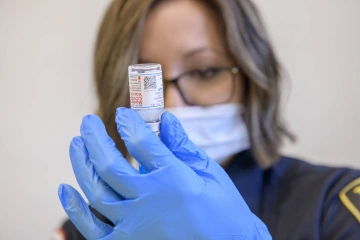
The first U.S. data to measure vaccine effectiveness against both symptomatic and asymptomatic COVID-19 specifically among first responders, health care and frontline workers show that the vaccines are highly effective in real-world working conditions.
Data from ongoing University of Arizona Health Sciences research studies show a 90% effective rate after the recommended two doses of Pfizer-BioNTech and Moderna COVID-19 vaccines, confirming trial studies. The findings were the first in the U.S. to measure vaccine effectiveness against both symptomatic and asymptomatic COVID-19 specifically among first responders, health care and frontline workers. “These new data on the effectiveness of the Pfizer and Moderna vaccines are extremely encouraging, and show how important it is for people to get vaccinated. Continuing our studies is becoming even more important as COVID-19 variants with increased transmissibility expand globally,” said Jeff Burgess, MD, MS, MPH, a professor at the Zuckerman College of Public Health. (March 29)
Contact
Margarita Bauzá
313-520-2109
mbauza@arizona.edu

